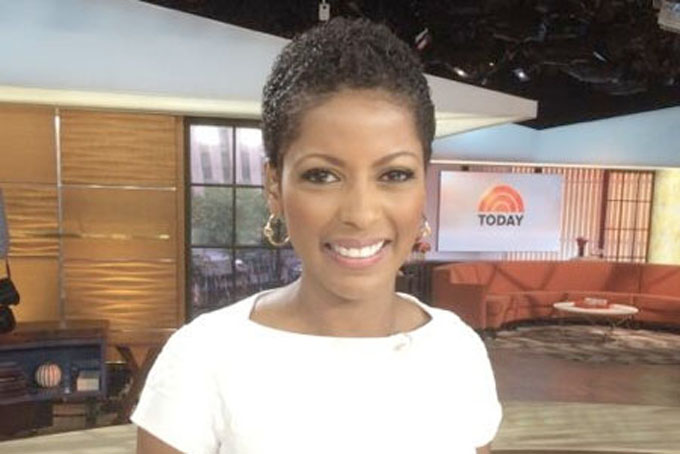
Friday morning, Tamron Hall, the “Today” show’s first African-American female co-host, unexpectedly revealed her natural kinks and curls on national television.
After the unveiling, the news program – in an “I can’t believe they’re actually doing this” move – polled its audience regarding whether Hall, 43, should stick with her natural look on-air.
Somewhat surprisingly and thankfully – given White America’s well-documented resistance to African-American women who buck conventional beauty ideals – 70 percent of viewers who tweeted in response said that Hall’s tightly curled style was a winner.
For many black women – even for those for whom unprocessed hair is no longer anything novel – her choice, and the reaction to it, do matter.
Why is that, when it’s 2014 and black women all over the country have been going natural for years and talking ad nauseam among themselves about whether to go natural, how to go natural and their go-to natural products? When this approach to hair care is so ubiquitous that it’s been deemed a “revolution,” how is it that this is relevant, when Hall is seemingly so late to the natural-hair game?
Well, because in America, Black hair has been and remains highly political. It has been used as a yardstick, for Blacks and Whites alike, to measure beauty, respectability and worth.
Just last week, BuzzFeed released a polarizing yet provocative video, “If Black People Said the Stuff White People Say.” In one of the most poignant scenes, a Black woman with natural hair looks at a White woman in dumbfounded disbelief, saying: “Your hair is amazing. You know it’s kind of like my golden retriever. So limp and lifeless, like, how do you do that?” thus illustrating an all-too-familiar ignorant line of dialogue that African-American women encounter when engaging with non-Black acquaintances or navigating predominantly wWhite workspaces.
In March, the U.S. Army released AR-670, its updated guidelines and grooming policy that prohibit natural-hair styles typically worn by Black women, such as cornrows, braids, two-strand twists and dreadlocks, and thus joined a long line of institutions, corporations and schools that have tried to regulate Black hair – as if it’s something that’s fair game to mandate and control.
And remember when the Washington Post in November proclaimed, “New York’s incoming first family says it all with their hair”? It asserted that Mayor-elect Bill de Blasio’s wife’s, daughter’s and son’s hair choices – dreadlocks, loose locks and Afro, respectively – put on rare display Black “hair politics” and was “perhaps a baby step toward a new political and cultural era.”
So Hall’s seemingly minor decision to go natural on air – because, as she explained, she was simply too tired to style her signature pixie with heat, blow-dryer and flat iron after a late night shooting a segment in the wilderness – may not seem significant, but there’s a case to be made that it is.
That’s because by sporting her natural hair on national TV, she has the potential to achieve something that Black women – natural, relaxed, braided or straightened – in office spaces and on hair blogs and throughout the country have been steadily working toward, in what’s been an uphill battle: communicating that our brand of beauty is normal and acceptable.
By the nature of Hall’s position as an adored “Today” show co-host and her broad appeal to a diverse audience, she’s an ambassador of sorts – uniquely positioned to pave the way for wider acceptance of black women’s natural hair just by putting it on display. That’s why even women who have shunned relaxers and hot combs for decades should be heartened by her evolving image and its warm reception.
Hopefully, Hall, tired or not, will continue to wear her hair exactly as it grows from her head, and by her doing so, her image will be ingrained subconsciously in the minds of the public – and of employers throughout America. Perhaps, then, they will think twice when evaluating the appearance of black employees and potential employees who make the choice to wear their hair in the way that makes the most sense for their personal lifestyles and aesthetic sensibilities.
Half the battle for full acceptance of natural hair is its presence in the mainstream and on the national stage. Hall, as much as she may have taken her time taking risks with her hair, is there.
(Erin C.J. Robertson is a summer intern at The Root.)
Source:
https://www.theroot.com/articles/culture/2014/06/tamron_hall_s_natural_hair_why_it_s_important.2.html